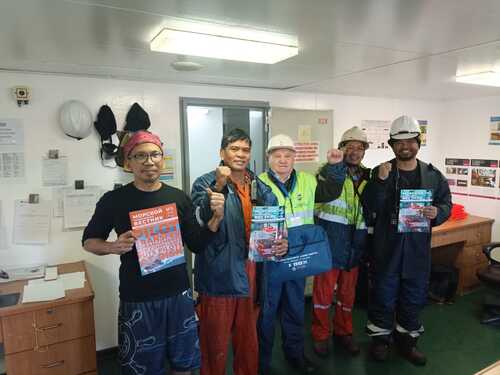ÐÎÑÑÈÉÑÊÈÉ ÏÐÎÔÅÑÑÈÎÍÀËÜÍÛÉ ÑÎÞÇ ÌÎÐßÊÎÂ
SEAFARERS' UNION OF RUSSIA
A NON-UNIONIZED SEAFARER
IS AN UNPROTECTED SEAFARER
Back
Greek shipowner uses Liberian flag of convenience to save on Filipino seafarers' salaries

On October 28, Inspectors of the Far Eastern Territorial Organization of the Seafarers' Union of Russia visited the bulk carrier Charilaos S, berthed at the Nakhodka Commercial Sea Port under a coal loading. The bulk carrier Charilaos S (flag of Liberia, IMO 9493925, 2011). The registered owner is Piraeus-based Greek company Charilaos Marine SA. The operator and the beneficial shipowner is Bright Navigation Inc., also Piraeus-based. The crew consists of 23 Filipino seafarers.
The FETO SUR inspectors explained to the captain the purpose of their visit, namely that the Paris and Tokyo Memorandums of Understanding on Port State Control are running the Concentrated Inspection Campaign in ports of Europe and Asia.
As part of this campaign, ships can be detained for failure to pay wages to seafarers and other serious violations of the terms of employment contracts. The purpose of the campaign is to ensure that seafarers' rights are not violated. Seafarers should have employment contracts containing provisions on wages, paid leave and the right to repatriation from a foreign port. Initially, the captain was very wary of the inspectors, and asked if there had been any complaints from the crew. The inspectors answered that there had been no complaints. After that, the captain provided all the documents required for the inspection: the crew list, individual contracts, insurance certificates, payrolls for the last two months. It turned out that there was no collective agreement with a seafarers' union. The salary of an AB Seaman is $1,484, and that of a captain is $9,500. The wages are paid on time and in full. The seafarers have individual contracts in hand. The seafarers were recruited through the state crewing agency in Manila - the "Philippines Overseas Employment Administration" (POEA).
The Inspectors told the seafarers gathered in the mess-room that they were working on a vessel under Liberian flag of convenience. Flag of convenience vessel means that the vessel is registered under the flag other than the flag of the shipowner's country.
Flags of convenience stirred up a lot of acute issues, including the emergence of numerous substandard vessels that do not meet the requirements of international conventions. When a vessel is registered under a flag of convenience, its owner will hire the cheapest labor available, pay minimum wages, and cut costs by lowering the standard of living and worsening the living conditions of seafarers.
Seafarers' unions around the world have united and developed and approved minimum wage levels for seafarers working on FOC vessels. So, an AB Seaman should receive at least USD1,836, and the amount of insurance payout in case of seafarer's death should be at least USD110,000. There are shipowners who don't comply with this requirement of trade unions and try to avoid negotiations with national seafarers' unions. In this regard, seafarers' unions have declared war on such shipowners. In particular cases, trade unions with the support of crew members carry out boycotts and arrests of these vessels around the world.
During the meeting with the crew members, the Inspectors handed them books in English on the rights of seafarers working on flags of convenience vessels and the latest magazines "Maritime Unions Herald" telling about the SUR activities.
The seafarers asked the FETO SUR representatives to send a notice-demand to the Greek shipowner about the need to sign a collective agreement with the Greek seafarers' union. FETO SUR inspectors invited off-duty seafarers to visit the International Marine Club of Nakhodka.
The crew heartily thanked the representatives of the
Seafarers' Union of Russia for their care and support of seafarers of all
nationalities.
Up
